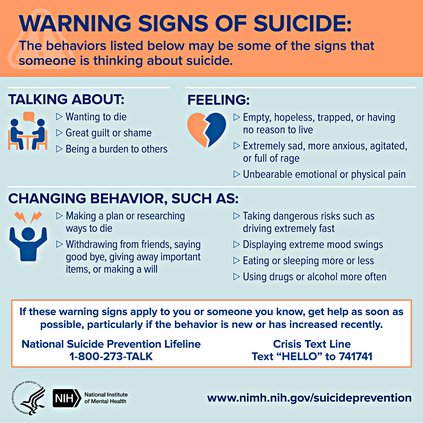When one discovers someone they know has suicidal thoughts, taking action quickly to prevent them from acting on those thoughts is imperative, mental health professionals say. But many struggle, not knowing what to do to help in that situation.
“The most important thing people can do to prevent suicide is to learn the warning signs, what to say to a suicidal person, and what to do,” said Gail Sullivan with the Center for Counseling and Consultation in Great Bend. “We need to get comfortable asking someone who has the warning signs if they are thinking of killing themselves.”
That gives the suicidal person the best chance to admit what they are thinking about and get the help they need, she said. “Staying with a suicidal person until they can see a mental health professional is very important, allowing them to talk and offering non-judgmental supportive listening and hope that things can change for them. Offering supportive follow-up to make sure they are no longer at risk of suicide is another thing that family and friends can do.”
Suicide Prevention across Kansas offers ASIST training, a two-day workshop in suicide first aid. ASIST teaches participants to recognize when someone may be at risk of suicide and help them to create a plan that will keep them safe. This training is meant for anyone in the community that wants to know how to help.
What things can you do when you discover someone you know has suicidal thoughts? Take action quickly, Sullivan said.
This gives the suicidal person the best chance to admit what they are thinking about and get the help they need. Staying with a suicidal person until they can see a mental health professional is very important, allowing them to talk and offering non-judgmental supportive listening and hope that things can change for them. Offering supportive follow up to make sure they are no longer at risk of suicide is another thing that family and friends can do.
You are not alone
When facing someone in crisis, one may feel all alone, Sullivan said. But they are not, Sullivan said.
Barton County has a Suicide Prevention Task Force under The Central Kansas Partnership. “Its mission is to reduce suicide attempts and deaths through awareness, education and outreach.”
Recently, the Task Force sponsored the annual Glow Run & Walk, which consisted of a remembrance ceremony, a drum circle warm up, and a 5K run or one-mile walk.
“Crisis screening is provided in the community by The Center for Counseling 24 hours per day, seven days per week to assess whether someone is a danger to themselves or others and in need of hospitalization or crisis intervention with a safety plan,” she said. “Our hope is that we can prevent a suicide attempt, allowing someone the time to get help.”
But, “access to mental health services needs to be improved,” she said. Availability of services and shorter wait times for accessing mental health services, increases access to medication services, and increases inpatient youth psychiatric hospital beds need to be priorities.
The Center offers open-access for outpatient services so that when a person has the need for mental health services, they can walk in to get an intake assessment, getting scheduled for the services needed the same day, she said.
Along those lines, in June 2018, Kansas Attorney General Derek Schmidt and the Tower Mental Health Foundation formed the Youth Suicide Prevention Task Force to survey efforts underway in Kansas to reduce the incidence of youth suicide and provide recommendations on further steps that could be taken. In May, the Legislature adopted several of those recommendations and created the Kansas Youth Suicide Prevention coordinator.
Signs and Symptoms
The behaviors listed below may be signs that someone is thinking about suicide.
• Talking about wanting to die or wanting to kill themselves
• Talking about feeling empty, hopeless, or having no reason to live
• Making a plan or looking for a way to kill themselves, such as searching for lethal methods online, stockpiling pills, or buying a gun
• Talking about great guilt or shame, or being a burden to others
• Talking about feeling trapped or feeling that there are no solutions
• Feeling unbearable pain (emotional or physical) or acting anxious or agitated
• Using alcohol or drugs more often
• Showing rage or talking about seeking revenge
• Withdrawing from family and friends
• Taking great risks that could lead to death, such as driving extremely fast
• Giving away important possessions
• Saying goodbye to friends and family
• Putting affairs in order, making a will
If these warning signs apply to you or someone you know, get help as soon as possible, particularly if the behavior is new or has increased recently.







